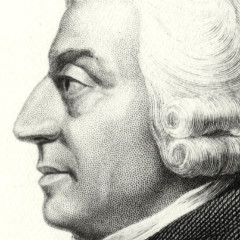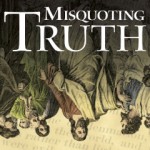
Not so with Adam Smith, whose tome revealed profundities from which anyone would profit — that is, unless you count the cost of actually digesting The Wealth of Nations. Any edition of this classic, published in 1776, is big and dense enough to double as a doorstop. Between American Idol and the latest Barack Obama coverage, who’s got the time? Taking a cue from that thoroughly modern doctrine, “To each according to his attention span,” in steps P. J. O’Rourke with On the Wealth of Nations (Atlantic Monthly Press, 2007) to explicate the truths of the great Scottish philosopher.
That is no small task. I speak from experience when I say that had Smith submitted his manuscript to a modern publisher at nine in the morning, it would have been summarily rejected by noon. That underpaid proletariat known as editors would have raised pitchfork and laptop at any text so unnecessarily long. Between the meandering sentences and discursive tangents, any reasonable editor would balk.
In handling Smith, O’Rourke has several advantages over the editors. First, his author is dead. Smith cannot complain that O’Rourke has missed some essential point buried 19 paragraphs into a wild goose chase that the distiller has just deleted. Next, O’Rourke is better paid and working on a more luxurious deadline than the typical editor — which means he can be more patient and gracious with his dearly departed author. Finally, O’Rourke is working from home, which means it’s easier to drink on the job when the job requires it (and this one surely must have).
The result is usually pleasant, generally useful, and refreshingly insightful distillation of Smith: from 900 pages down to 242. Not a bad day at the office.
The best example of O’Rourke’s concision also happens to be the most important for the book, boiling the entire thing down to a simple elevator pitch: “The Wealth of Nations,” he writes, “argues three basic principles and, by plain thinking and plentiful examples, proves them. Even intellectuals should have no trouble understanding Smith’s ideas [of] . . . pursuit of self-interest, division of labor, and freedom of trade.”
It’s the Cliffs Notes version or, better, Adam Smith for Dummies (which a quick Amazon search reveals does not yet exist). This “trinity of individual prerogatives” makes a useful guidepost for meandering through the tangle. When Smith is going on about the history of currency, for instance, or handily dismantling the theories of the French physiocrats, readers can know the ultimate relevance is tied to the Big Three.
O’Rourke also does a decent job of intellectual backfill. A common but woefully misinformed criticism of Smith is that he was simply counseling selfishness. But The Wealth of Nations is not a self-help book; it’s a book about how to improve the station of humanity. And it happens to be a sequel. Smith’s first book, A Theory of Moral Sentiments, deals with improvement from a moral perspective, while Wealth comes at the same subject from the material angle. To put it in more biblical terms, Smith’s books are the two tablets of the Law — one deals with more lofty concerns, the other says don’t boost your neighbor’s burro.
The whole of the man’s corpus is important to keep in mind because the people who pretend that they’ve read Das Kapital like to think of Smith as a monomaniacal prophet of greed. The critics have it exactly backwards. Smith attacks merchants and government officials (mercantilists) not out of a bizarre devotion to abstract principles but precisely because they are advancing their own good on the backs of others. Even capitalists think that’s bad.
As for Smith’s politics, O’Rourke writes that his views were “conventional” and “mildly reformist.” But in many respects, Smith was as radical as they come. He attacked the guild system and government planning when these were considered part of the natural order — as British as bad teeth and kidney pie. He defended free trade at a time when His Majesty’s government managed international exchange for the benefit of empire generally and London specifically. Though criticizing the American colonists as freeloaders, Smith nonetheless advised that “Great Britain should voluntarily give up all authority over her colonies, and leave them to elect their own magistrates, to enact their own laws, and to make peace and war as they might think proper.” This act of goodwill might dispose Americans “to favour us in war as well as in trade, and, instead of turbulent and factious subjects, to become our most faithful, affectionate, and generous allies.”
On all of these points, Smith was eventually vindicated. The value-added for O’Rourke readers is that he shows the myriad ways in which Smith is still being vindicated, bringing the arguments and observations of Wealth to bear on such current headache inducements as the debates over globalization, privatization, even pork-barreling. As O’Rourke quotes Smith, “A great bridge cannot be thrown over at a place where nobody passes, or merely to embellish the views from the windows of a neighboring palace.” Sen. Ted Stevens, call your office.
Some of Smith’s arguments now seem so obvious that readers may wonder why our forebears didn’t see things that way (or why Congress still doesn’t in some cases). This book is a recovery effort, to acquaint a new generation with Smith’s work and his world. It’s no light chore. “Adam Smith,” writes O’Rourke, “helped produce a world of individuality, autonomy, and personal fulfillment, but that world did not produce him.”
Like all books, this one is a mixed bag. The insights are excellent, but the style is at times awkward — perhaps an odd thing to say of such an accomplished stylist. O’Rourke is a wag, a wit, a wisenheimer. His job is to be substantive while making readers snigger. He is a master of this delivery, having pulled off this combo brilliantly in the past; All the Trouble in the World and Eat the Rich are both minor triumphs in their scope and depth and snigger stimuli. But with this volume it sometimes seems as if the shtick is stuck.
There are points at which I wanted more lecture and less lark. It could be a simple problem of misaligned expectations. With authors such as Steven Landsburg, Tim Harford, even Steven Levitt, I’ve grown accustomed to popularizers of economics who explain things effectively, lightly, even humorously, without trying to punctuate every other sentence with a rim shot.
Still, if you want to get a sense of what Smith was trying to say and why it so radically changed the world, then O’Rourke provides an ideal point of departure. It’s either that or slogging on your own through Smith’s tangent about the “Variations in the Value of Silv….” What was that about Obama?
(First appeared in the May 2007 issue of The American Spectator.)












